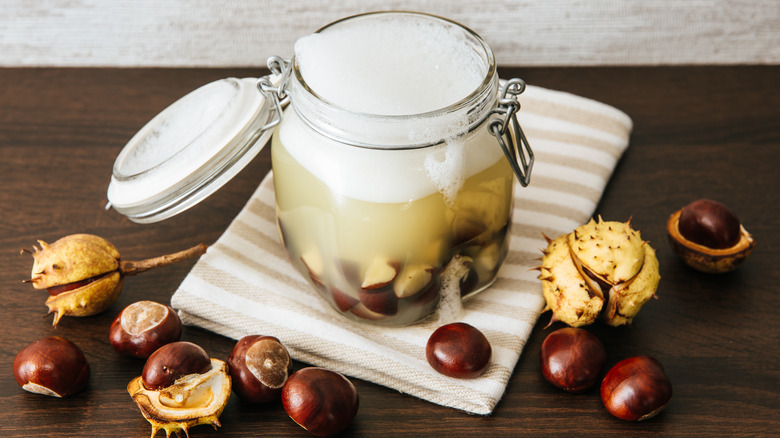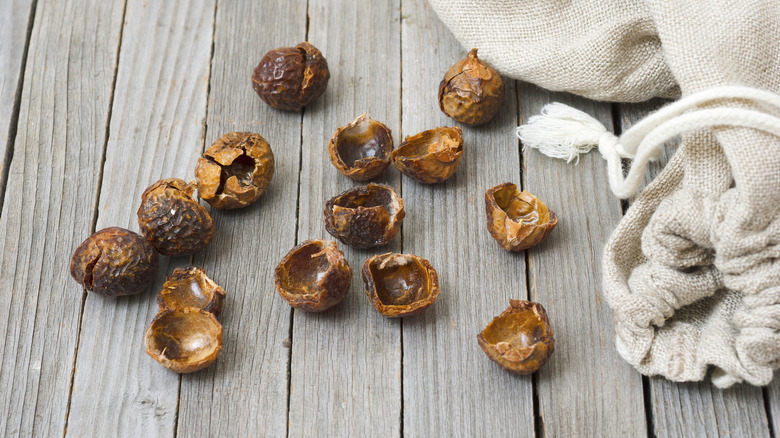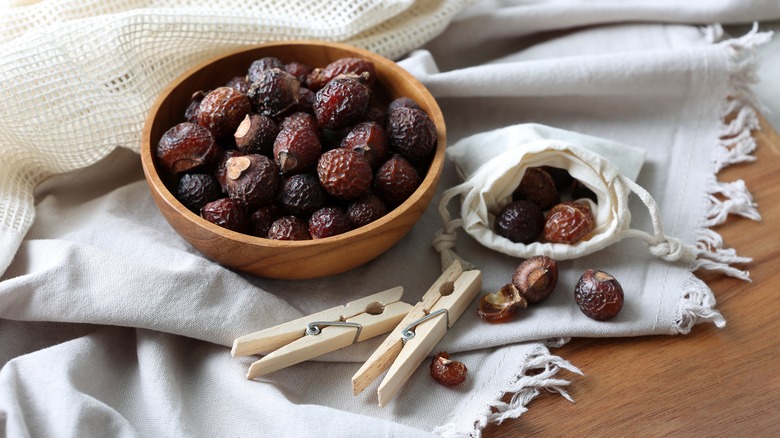What Are Soap Nuts, And Can You Use Them As A Laundry Detergent Alternative?
We may receive a commission on purchases made from links.
Whether you're trying to make your home more eco-friendly or attempting to swap out chemical-laden products for natural cleaning solutions, soap nuts may be the answer. They're the perfect alternative to regular laundry detergent, especially if you're trying to live a greener lifestyle. Detergents are packed with synthetic chemicals, which can harm both our environment and our health. For example, most detergents contain phosphates which soften the water and help remove dirt easier. However, when the water is rinsed away and sent down the sewers, the phosphates encourage algae bloom, which removes oxygen from the water and can negatively impact surrounding aquatic life. Not only that, but harsh chemicals in regular detergents can also cause problems for those with sensitive skin or allergies. Soap nuts are an all-natural alternative to detergent that can get your clothes just as clean but without all the negative side effects.
Soap nuts are actually dried fruit from the Nepalese Reetha tree, commonly found in the Himalayan foothills. These dried fruits naturally contain saponin, which are chemicals that create a foamy residue when mixed with water. They also help lift dirt, grime, and grease, effectively cleaning your laundry, per a 2021 article published by Sci. Furthermore, they're hypoallergenic, making them a great choice for those who need a gentle detergent. You can use them as a stain pre-treatment, a handwashing soap for delicate laundry, or a concentrated detergent. Here is a closer look at how to use soap nuts in your laundry.
How to use soap nuts in your laundry
The saponin in soap nuts is concentrated in the dried fruits' shells, so you will use the shells to clean your laundry. As they are soaked in water, they release the saponin into the liquid, which will then remove stains the same way a synthetic laundry detergent would. An over 2.2 pound bag of soap nuts can be purchased from Green Global Goods on Amazon for about $34.
You can place four to six shells in a muslin bag and throw them into the washer with your dirty laundry. On the other hand, to make liquid soap, you'll need to simmer the shells in water. Pour about 4 cups of water into a pot on the stove and bring it to a boil. Lower the heat to a simmer and then add about 1 cup of soap nuts. Let them soak in the simmering water for at least 20 minutes and strain the liquid. This liquid is what you will use as your detergent.
As for how much detergent to use per load, this might take some experimenting, as different recipes recommend using different tablespoon amounts. Some recommend using 1 tablespoon for a small load, 2 tablespoons for a medium load (and so on), while others recommend using 4 tablespoons for a medium load. It really depends on how many cups of water you use to make the soap, with a more diluted concentrate requiring you to use more tablespoons.
Caveats to keep in mind
Since the liquid from soaked soap nuts is an all-natural laundry detergent, it doesn't have as long as a shelf life when compared to synthetic types. While store-bought detergents can last anywhere from six months to a year after being opened until they expire, this alternative can only last about one week in the open air or two to three weeks in the fridge. To give it a little more lasting power, you can try freezing the detergent into cubes, which would be viable for up to 3 months. When creating the ice cubes, ensure you make different load sizes. Smaller cubes can have 1 to 2 tablespoons of detergent (best for small or medium loads), while larger cubes can have 3 to 4 tablespoons (best for larger loads).
Another thing to keep in mind is that soap nuts won't create as many suds as regular detergents. However, that doesn't mean they're not as potent or efficient. In fact, how sudsy a detergent gets has nothing to do with how well it cleans, since bubbles are just air trapped in the soap. Therefore, they're not necessary to wash anything. Instead, what is necessary is the surfactant in the soap, which decreases the surface tension in the water, making it easier to whisk dirt away. In soap nuts, the surfactant is the natural saponin, meaning that they're an effective detergent.



